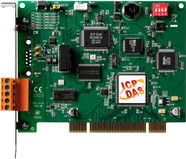ICPDAS PISO-CM100U-D
One Standalone Intelligent CAN Communication Board
● Microprocessor inside with 80186, 80MHz
● 82C250 CAN transceiver
● SJA1000T CAN controller
● Support both CAN 2.0A and CAN 2.0B
● Timestamp with at least ±1ms precision
● DIP switch to select board number
● Dual port RAM communication mechanism
● RTC (real time clock) inside
The CAN (Controller Area Network) is a serial communication protocol, and efficiently supports distributed real-time control with a very high level of security. It is especially suited for networking "intelligent" devices as well as sensors and actuators within a system or sub-system. In CAN networks, there is no addressing of subscribers or stations in the conventionel sense, but instead prioritized messages are transmitted.
ICP DAS provides an open architecture platform for CAN bus-PISO CM100. The PISO-CM100 represents a very powerful and economic solution of an active CAN board with one CAN channels, covering a wide range of CAN applications. The 16-bit on-board microcontroller allows, among many other features, the filtering, preprocessing, and storage (with timestamp) of CAN messages as well as the real-time transmission of CAN messages. PISO-CM100 also uses the new Phillips SJA1000T and Transceiver 82C250/251, which provide bus arbitration and error detection with auto correction and re-transmission function. Under the effect of the powerful microcontroller, this card can be made for one CAN controller without losing data, even in systems with a high bus load. Besides, equipped with integrated intelligence functions, the PIO-CM100 makes it is possible to preprocess CAN data streams, thus relieving the PC of a considerable burden. As a result, real-time requirements on the PC applications are drastically reduced. Due to the state-of-the-art, it can be installed in a slot of 5V 32-bits PCI bus and supported truly “Plug & play” technology.
In addition, users can develop their own CAN application by using the PISO-CM100 library. When the PISO-CM100 is active, the data exchange between users' application and CAN bus firmware is performed via the memory mapping method of the PISO-CM100.
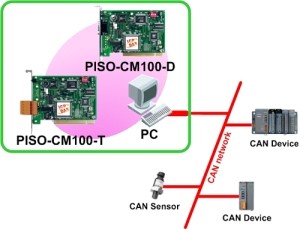
APPLICATIONS:
● DeviceNet, CANopen, CAN J1939, SDS (System Wide Network) protocol application
● CAN bus communication application
● Industry Automation
● Industrial Machinery
● Building Automation
● Food & Beverage
● Semiconductor Fabrication
● Control System

HARDWARE ARCHITECTURE: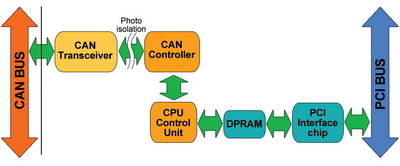
SOFTWARE ARCHITECTURE: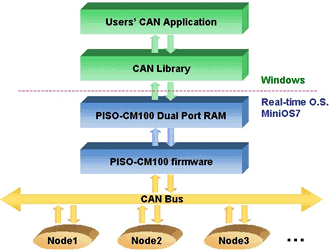
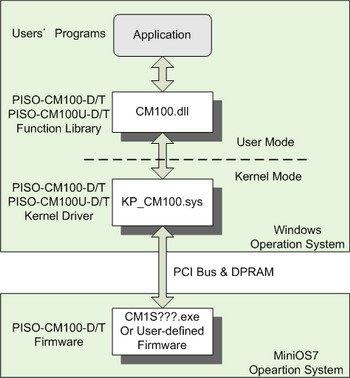
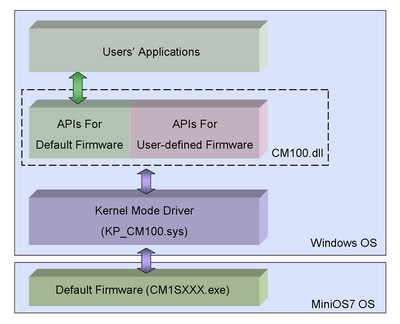
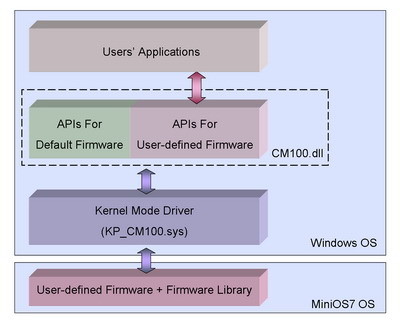
| CPU | 80186, 80 MHz or compatible |
| SRAM/Flash/EEPROM | 512 KB / 512 KB / 16 KB |
| DPRAM | 8 KB |
| NVRAM | 31 bytes (battery backup, data valid for up to 10 years) |
| RTC (Real Time Clock) | Yes |
| Type | Universal PCI, 3.3 V and 5 V, 33 MHz, 32-bit, plug and play |
| Board No. | By DIP switch |
| Controller | NXP SJA1000T with 16 MHz clock |
| Transceiver | NXP 82C250 |
| Channel Number | 1 |
| Connector | 9-pin male D-Sub |
| Baud Rate (bps) | 10 k, 20 k, 50 k, 125 k, 250 k, 500 k, 800 k, 1 M (allow user-defined baud rate) |
| Isolation | 3000 VDC for DC-to-DC, 2500 Vrms for photo-couple |
| Terminator Resistor | Jumper for 120 Ω terminator resistor |
| Round LED | Rx/Tx LED, ERR LED |
| Timestamp | Timestamp of CAN message with at least ±1ms precision |
| Power Consumption | 300 mA @ 5 V |
| Dimensions (w x l x h) | 138 x 22 x 105mm |
| Operating Temperature | 0 °C ~ +60 °C |
| Storage Temperature | -20 °C ~ +70 °C |
| Humidity | 5 ~ 85% RH, non-condensing |

